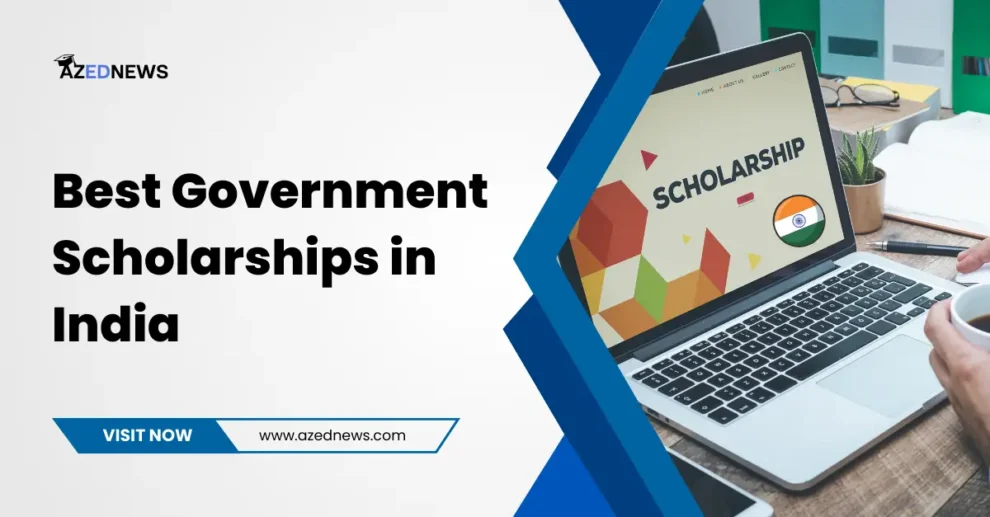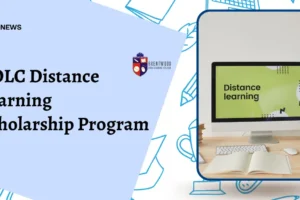Every year, high school and college students receive the best government scholarships in India from the Ministry of Education. There are several kinds of scholarships out there. Before giving out a scholarship, a student’s qualifications, grades, and financial needs are all considered.
Table of Contents
82,000 government scholarships are reportedly awarded each year to students wishing to pursue graduate or postgraduate degrees at colleges and universities as well as professional programs in fields like engineering, medicine, and other fields.
The goal of the Indian government’s scholarship programs is to allow worthy Indian students to pursue their academic goals at prestigious overseas colleges and universities. In addition to easing financial burdens, these scholarships encourage cross-cultural interactions, collaborative research, and the formation of future leaders who can support India’s progress and development.
In this blog, we have given details about the various scholarships sponsored by the government of India.
Key Takeaways:
- Several high school and college students in India receive some of the best government scholarships in India.
- The goal of the Indian government’s scholarship programs is to allow worthy Indian students to pursue their academic goals at prestigious overseas colleges and universities.
- Indian government scholarships allow students to study without worrying about debt hence enhancing performance.
- Some of the types of government scholarships in India are merit-based, student-centered, and based on needs.
- The top best government scholarships in India include the Fulbright-Nehru Master’s Fellowship.
- The eligibility criteria vary from scholarship to scholarship depending on various factors.
What are the benefits of applying for the best government scholarships in India?
These days, one of the most valuable and costly things is education. Most recent high school graduates look for financial aid in order to pursue careers that require a multi-year degree. In this case, scholarships are the most requested type of financial assistance.
The following are a few advantages of scholarships:
1. No hassle of debts:
Many graduates of college have enormous student loan debt. Their schooling is hampered by the idea of having to repay the full sum. They are also under a lot of pressure to get attractive compensation packages. Eliminating the financial obstacle supports your professional and academic objectives. You have the freedom to follow your dreams with an open mind.
2. Enhanced performance:
Getting a scholarship takes care of all your financial concerns. You will therefore have more time to learn, study, and raise your grades. You will also have plenty of time to search for opportunities to expand your knowledge and enhance your talents.
3. Career advancement:
Getting a scholarship is a great honor. Getting a scholarship will help your chances of finding work in the future because they are given out on the basis of merit. There are certain highly competitive scholarships that are so impressive you can include them as accomplishments on your CV. During your job search, distinguish yourself from the competition by being chosen for scholarships. It serves as a model for upcoming candidates to meet expectations.
What are the types of government scholarships in India?
Numerous scholarships are offered to students at various levels. The best of them can be obtained with the correct planning and investigation. Study abroad scholarships go mostly into one of the following categories:
1. Merit-based:
In this case, a student’s eligibility and award are determined by their academic record and their accomplishments in extracurricular activities like athletics or community service. The ideal candidate for this kind of scholarship is one who has demonstrated more academic achievement.
2. Student-centered:
Some scholarships are awarded according to the student’s family, gender, color, religion, and other characteristics. Scholarships based on a specific medical history or condition may also be given consideration by some nations or organizations.
3. Based on Destination:
Students from a certain nation are eligible to apply for scholarships and support from a number of government organizations, governments, and universities. For instance, the governments of New Zealand and the UK provide fellowships to international students from Commonwealth nations, which includes India.
4. For Particular Subjects:
Certain colleges and institutions may offer grants to students who want to pursue a particular subject or course of study. For instance, universities offering scholarships in this specific category can help students who wish to pursue an MBA in Business Analytics Colleges in India
5. Needs:
These scholarships are intended for students who are financially challenged and are given out based on the student’s financial circumstances. You could be required to provide documentation such as income proofs, employment certificates, ITRs, and details about your family’s income to be considered for these kinds of scholarships.
6. For Athletes:
Only the top athletes are eligible for this kind of scholarship program. To get the funding, you must balance your academic obligations with participation in demanding training and tournament representation for your university.
What are the Top 7 best government scholarships in India?
1. Fulbright-Nehru Master’s Fellowship:
The Fulbright-Nehru Master’s Fellowship is an opportunity granted by the Indian government to deserving Indian students to pursue master’s degrees at certain American colleges and institutions. It is awarded based on merit and need. Students with leadership abilities, a bachelor’s degree equivalent in the USA, and at least three years of experience in a professional setting are eligible for a one- or two-year fellowship.
The candidate must choose one field of study that aligns with their area of interest from Arts and Culture Management, Economics, Environmental Science, Journalism and Mass Communication, Higher Education Administration, International Affairs, Public Administration, Public Health, Urban and Regional Planning, International Legal Studies, and Women’s Studies/Gender Studies.
Eligibility:
- The candidate must be the holder of an authorized Indian university’s bachelor’s degree, equal to one in the United States, with at least a 55% overall grade point average.
- A minimum of three years of full-time, paid work experience in a career linked to the requisite field of study must have been completed by the student.
- The applicant has to have proven their capacity for leadership and their commitment to voluntary work.
- The applicant cannot have a degree from a U.S. university or be enrolled in a degree program there.
- Should the candidate be hired, they will have to strictly follow the employer’s endorsement policies.
Benefits:
- Money for living expenditures, education, and other associated expenses
- aid with J-1 visas
- Airline tickets for two from the candidate’s hometown to the US in economy class.
- U.S. government regulations regarding illness and accident coverage.
How to apply?
- You must apply online through the official portal
- Before getting started on your online application, please read the FNMaster’s Applicant Instructions thoroughly
- Before submitting the application, please review FNMaster’s Applicant Checklist
- You must also fill out the FNMaster Applicant Annexure and, if necessary, the FNMaster Employer’s Endorsement Form, and attach these to your online application
2. National Overseas Scholarship:
The Ministry of Social Justice and Empowerment founded the National Overseas Scholarship in order to promote social and economic justice. With the help of this scholarship, low-income students from landless agricultural laborers, traditional artisans, scheduled castes, and tribes can pursue master’s, doctorate, and post-doctoral degrees overseas.
Eligibility:
- The maximum age for the applicant is 35.
- At least a 60% score on the qualifying exam was required of the candidate. The Bachelor’s degree is the qualifying exam for the Master’s degree course, and the Master’s degree is the qualifying exam for the PhD course.
- In the previous fiscal year, the family’s combined annual income should have been less than INR 8,00,000.
- A household may apply for up to two scholarships each year.
- Thirty percent of seats are open to female candidates.
Benefits:
- The price of living expenses, books, and visa fees
- Cost of health insurance
- Voter tax
- Airfare plus other out-of-pocket costs
- Maintenance fee
- Dependent remuneration
How to apply?
- Students must use the online portal by the deadline to submit their completed applications and any necessary supporting paperwork.
- According to the Ministry’s standards, all students must provide self-attested copies of the following records.
- Proof of Date of Birth
- All Degrees/ Diploma/ Certificate along with mark sheets
- Income Certificate of Family
- Offer Letter College/ University
3. The JN Tata Endowment Higher Education of Indians:

The J. N. Tata Endowment provides one-time financing help to Indian students pursuing full-time postgraduate, PhD, postdoctoral, and research fellowships overseas. One lakh to 10 lakh rupees is the range of loan amounts. It permits some students to get partial travel subsidies of up to INR 50,000 even though it does not entirely cover the cost of school.
The candidates must complete an online exam and an interview to be chosen. The online test is based on the universally applicable Thinking Skills Assessment (TSA). The rigorous technical interview assesses the candidate’s knowledge of current and forthcoming subjects. The final decision is based on the candidate’s exam results, academic standing, and interview performance.
Eligibility:
- The student must be under 45 years old and an Indian citizen.
- The applicant must possess a graduate degree with a minimum grade point average of 60% from a recognized Indian university.
- Applicants who were not previously qualified for the loan scholarship are also encouraged to submit an application.
- Assume they have at least another year of schooling left. In that scenario, candidates may still apply at the end, either at the beginning of the first year or the start of the second year, even if they missed the J N Tata Endowment application deadline at the beginning of their study abroad program.
- It is necessary for candidates to be admitted into a course recognized as a Graduate Program.
Benefits:
- A loan of between INR 1,000,000 and INR 10,000,000.
- Travel reimbursement in part up to 50,000 Indian rupees.
- A gift prize with a value between $2,000 and $750,000
How to apply?
- Use your email address to register. Any further correspondence will only be sent by email.
- Upon meeting the prerequisites, candidates will get an email including a 48-hour temporary password. It is necessary to reset the password within 48 hours.
- Complete the online application. Candidates cannot have any blank spaces in their profiles.
- Send in the required student documentation.
- Documents required
- Candidate’s photo (500 * 500 pixels in jpeg format)
- Aadhar card
- Pan card
- Passport (first & last page)
- Transcript/s for each qualification
- Scorecards (GRE/GMAT/TOEFL/IELTS/PTE)
- Statement of Purpose (SOP)
- Resume
- Letter of admission
- Cost of Education
- Source of funds
- Letter of Recommendation (Only the recommender’s name, title, department, city, name of the college, university, or organization, and official email address should be provided by candidates. For the LoR, the Endowment will speak with the recommender directly)
- The final year mark sheets and degree certificate (if not uploaded in the first phase)
- Certificate of scholarships/ranks/prizes (if any)
- Co-curricular and extra-curricular activities
- Research work/Project work (only One)
4. Erasmus Mundus Joint Master Degree:
The European Union finances scholarships to Indian students enrolled in Masters-level study programs offered by Erasmus Mundus Joint Master’s degrees. A global partnership of universities and other educational establishments (HEIs) creates and administers an EMJM study program.
At least three HEIs from three different countries two of which must be EU members make up an EMJM. This enables the students to pursue their education in a minimum of two distinct European nations. The value of the scholarship varies based on the nation and the degree selected, but it often pays for tuition, living expenses, and travel expenses.
Eligibility:
- The candidate needs to be an Indian citizen.
- In the preceding five years, the student shouldn’t have lived in any European nation for longer than a year.
- It is not appropriate that the candidate was awarded a scholarship of a similar kind by Erasmus Mundus Action 2.
- The applicant must possess both relevant job experience and a bachelor’s degree.
Benefits:
- A monthly stipend of up to 1500 euros
- Full tuition.
- Compensation for travel.
- Return tickets
- Work Permit after earning a PhD or Master’s degree
How to apply?
- Examine the ENJMD catalog online.
- Select three programs that meet the requirements.
- Speak with and apply directly to the consortium.
5. Lady Meherbai D Tata Education Scholarship:
The Lady Meherbai D Tata study Trust provides scholarships to Indian women graduates who wish to continue their study abroad in order to partially defray the expense of tuition.
The Lady Meherbai D. Tata Education Trust offers scholarships in the following areas: gender studies focusing on domestic violence and other issues affecting Indian women, education, psychology, sociology, law with a focus on women’s and children’s issues, communication for development, community and rural development, public policy, public administration, and social work in areas such as women in prison.
Eligibility:
- The applicant must be an Indian woman citizen.
- The applicant must have an outstanding academic record and a degree from a recognized university.
- The applicant’s application or admission offer must have been received by reputable American, British, or European colleges.
- The candidate needs to have two years of relevant work experience.
Benefits:
A maximum tuition amount of INR 3,60,000
How to apply?
If you are eligible for the Lady Meherbai D. Tata Education Trust Scholarships, email igpedulmdtet@tatatrust.org requesting the scholarship application form. Included in the email must be the following documents:
- Course you wish to pursue
- The university you are planning to attend
- Course Fees
- Source of Funding (in brief)
- Current profile
6. Agatha Harrison Memorial Fellowship:
The Ms. Agatha Harrison Memorial Fellowship winner will receive a fully funded government scholarship to attend Oxford University London’s St. Antony College. The fellowship is primarily intended for students who are thinking about pursuing careers in history, political science, or economics as academic fields. It is entirely administered by the HRD Ministry.
Eligibility:
- The candidate needs to be an authorized Indian citizen.
- The candidate should be between the ages of thirty and forty.
- At least 60% of the points that might be earned at the master’s level must have been earned by the candidate.
- The applicant should have a PhD in the appropriate discipline or a similar body of published work.
- The candidate needs to be an expert in history, economics, or political science.
- The candidate must have taught at the graduate or postgraduate level for a minimum of three years.
Benefits:
- Round-trip economy class airfare for the candidate and their spouse if the spouse remains in the UK for a full year
- An allowance
- financing for travel
- College meal plan
- Administrative fees
How to apply?
- It is required that you apply on the official website.
- Documents needed: certificates of all prior exams and degrees that have been self-attested. The DOB has to be on the records.
- Research Idea: A detailed research program (at least 500 words) that explains why they chose to conduct their study or research in the United Kingdom.
- Picture & Signature: Upload your signature and a current passport-sized photo. Each should have the following specifications: 200 x 230 pixels; 530 kb in size.
- When presenting foreign degrees and diplomas, equivalency documentation (Certified by the Competent Authority) must be provided.
- Experience letter or employment certificate
7. The Inlaks Shivdasani Scholarships:
Since its founding in 1976, the Inlaks Shivdasani Foundation Scholarships have given grants to worthy Indian students. Applying for this scholarship is open to anyone who wants to study MPhil, Masters, or PhD programs in the UK, USA, or throughout Europe. This charity has partnered with numerous colleges to offer scholarships, including Science Po, the School of Oriental and African Studies, the University of Cambridge, Imperial College London, and many more.
Eligibility:
- The age limit for applicants is thirty years or older.
- They need to have graduated from a prestigious university with honors.
- International applicants for the scholarship must have lived in India at the time of submission.
- Assume that the candidates have been studying for degrees in the humanities, social sciences, law, fine arts, architecture, and other relevant fields. If so, they need to have graduated from an accredited university or institution with a minimum academic grade of 65%, a CGPA of 6.8, or a GPA of 2.6.
- Let’s say, however, that they have been working toward a degree in environmental studies, sciences, mathematics, or a comparable discipline. In such instances, applicants must have graduated from an accredited university or institution with a minimum academic grade of 70%, a CGPA of 7.2, or a GPA of 2.8.
Benefits:
- Health stipend
- School Fee
- Living costs
- One-way travel reimbursement
How to apply?
A person may only submit one application at a time. The steps listed below can be used to apply:
- Go to the Inlaks Shivdasani Foundation Scholarship’s official website.
- There will be a terms and conditions tab that candidates must accept in order to continue. Before doing so, though, make sure you properly read the terms and conditions. Then use “Click here” to get to the tab.
- Please provide your name, gender, and date of birth.
- Include a current CV, passport, and photo.
- Enter your email address and mobile number. Enter the verification code that was sent to your email address or mobile device.
- Include your permanent address, correspondence address, and the city and state to which you belong.
- Give your admissions requirements after that. This covers both the course and the subject for which you are applying. Indicate the duration of your course as well.
- It is imperative for candidates to explicitly declare if they have applied for any awards or concessions other than Inlaks. They also need to mention if they have ever applied for a loan of any kind.
- The English language requirements must be met.
- Candidates must list their professional experience and university degree in the next two sections. In addition, they have to indicate whether they have been awarded any grants, scholarships, or academic honors during their degree program. It is also necessary to list any awards that one has received from extracurricular activities.
Frequently Asked Questions:
1. How is a government scholarship awarded to a student?
While the National Scholarship Portal, a specialized online portal for scholarship implementation and disbursement, offers the majority of federal and state government scholarships, some states have their own scholarship portals that students can use to apply for government funding.
2. What costs are normally covered by Indian government scholarships?
Indian government study abroad grants typically cover a variety of charges, including living expenses, travel expenses, tuition, and housing costs, in addition to a monthly stipend. The coverage could change based on the particular scholarship program.
3. How many different kinds of government scholarships exist?
Merit-based, means-based, and merit-cum-means-based scholarships are the three main categories into which government scholarships fall. Means-based scholarships are awarded based on a student’s financial need, whereas merit scholarships are awarded based on a student’s academic merit.
4. Can a student receive government scholarships more than once?
A significant requirement associated with the majority of government scholarships is that applicants are not permitted to apply for two or more scholarships concurrently. Scholarship to scholarship differs in this regard. Students are only allowed to apply for and receive one scholarship at a time, regardless of how many they are eligible for.
5. Do I still have to spend money if I win a scholarship?
Scholarships typically pay a study abroad student’s living expenses, tuition, and occasionally travel and insurance charges. You could still need to use your money for other unique necessities and personal expenses.
Conclusion:
An Indian government scholarship has a big impact on a student’s life. It frees them up to follow their goals without worrying about money. Before giving out a scholarship, a student’s qualifications, grades, and financial stability are all taken into account. With a scholarship, all potential sources of stress or pressure are removed from the students, allowing them to concentrate on their studies. It increases their job prospects as well.












Add Comment